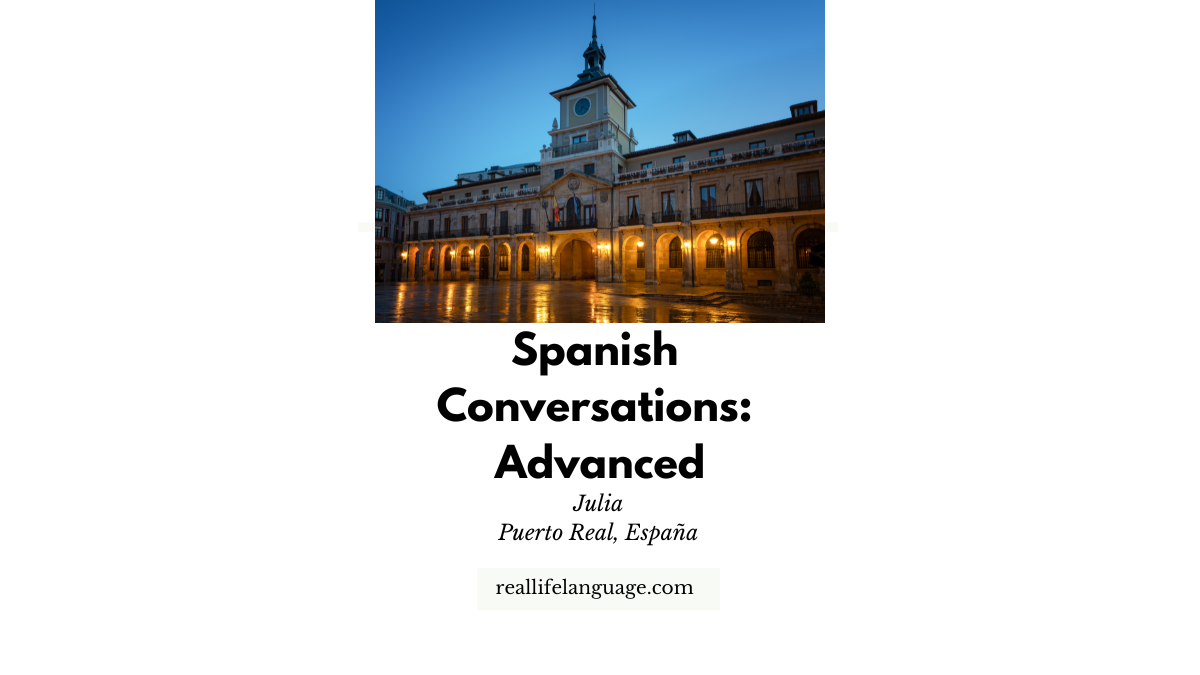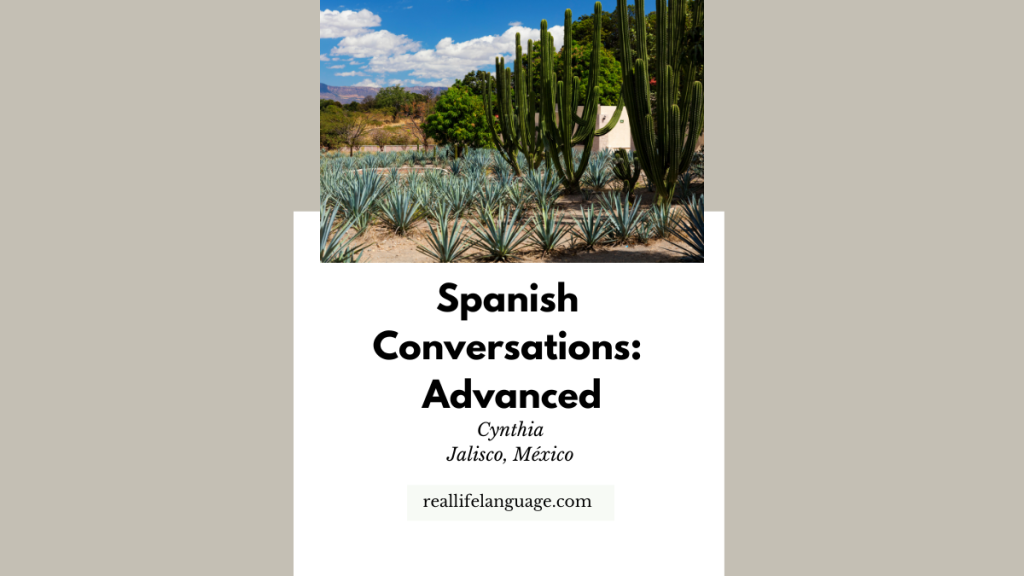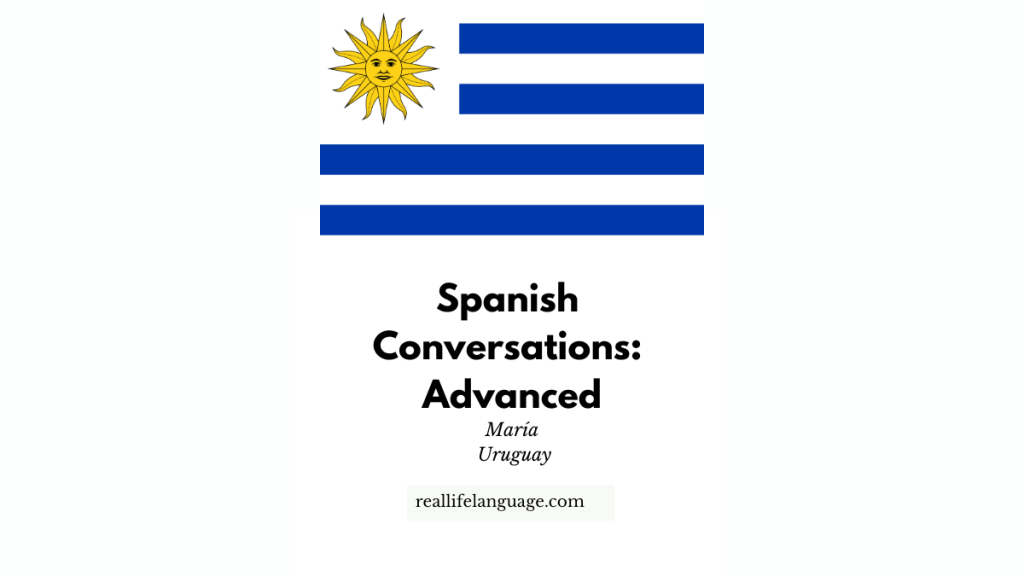
This article outlines content from an original conversation video to help learners who want to learn advanced Spanish. It summarises Julia’s experiences growing up and living in Spain, and it provides practical vocabulary, phrases and cultural notes that learners can use to improve comprehension and speaking skills.
Overview: Who is Julia and why this conversation matters
Julia is from Puerto Real, Spain. In the conversation she explains her personal and professional journey: studying English independently, attending university to study English philology, doing internships and volunteer work with Erasmus students, and training to teach Spanish online. Her story touches on broad social topics—women’s rights, the economy, housing, education, food and family life—which makes the conversation useful for learners who want to learn advanced Spanish in context.
Life and studies: studying languages and teaching Spanish
Julia describes a non-linear educational path. She started studying seriously in her mid-twenties, taught herself English, then studied English philology at university and spent six months in Germany. After that she did internships and translation work, and finally trained to teach Spanish—especially via online classes.
Useful phrases and vocabulary from this section:
- aprender por mi cuenta – to learn on my own / self-taught
- filología inglesa – English philology
- hacer prácticas / prácticas – to do internships / internships
- dar clases online – to teach online
- voluntariado – volunteer work
Women in Spain: a changing role
Julia reflects on how women’s roles in Spain have evolved. She notes that during the dictatorship (roughly mid-20th century) women’s roles were limited to mother and wife, with restricted rights such as needing male permission for divorce or work. Over time rights improved, but issues persist—most notably a gender pay gap and unequal opportunities in some fields (for example, actresses earning less).
“The role of women was null and they were only women to be a mother and wife… little by little we are achieving a little equity.”
Key expressions to discuss gender and society:
- derechos de las mujeres – women’s rights
- brecha salarial – pay gap
- igualdad de género – gender equality
The economy and housing: why independence is difficult
Julia explains that Spain’s economy has been hit by crises (2008 financial crisis, and more recently rising energy costs due to the war in Ukraine). Salaries haven’t risen in line with prices, making it hard for young people to become independent. Many people in their thirties still live with their parents because housing is expensive.
On housing: apartments are common, especially near city centres and tourist areas. Short-term rentals can drive up prices in summer, and buying a property is increasingly unaffordable for young people.
Useful vocabulary:
- vivir con los padres – to live with one’s parents
- independizarse – to move out / become independent
- alquilar – to rent
- comprar una vivienda – to buy a house
- crisis económica – economic crisis
Education system in Spain: structure and challenges
Julia views Spain’s education as high quality but somewhat rigid and general. She outlines the five levels: Early childhood (0–6, not compulsory), Primary (6–12, compulsory), Compulsory Secondary (12–16), then options for further study. Students who aim for university typically do Bachillerato (two years) with different modalities depending on the intended degree (languages, sciences, etc.). Vocational training (Formación Profesional) is also a viable, practical alternative.
Key terms:
- educación infantil – early childhood education
- educación primaria – primary education
- educación secundaria obligatoria (ESO) – compulsory secondary education
- Bachillerato – the two-year pre-university stage
- Formación Profesional – vocational training
Parties, leisure and food culture
Social life in Spain mixes neighbourhood traditions with modern nightlife. Julia enjoys meeting friends and the tapas culture, which allows people to try many small dishes. She mentions Andalusian stews, “potaje”, paella-like rice dishes, and desserts such as arroz con leche (rice pudding with cinnamon). In northern Spain, “pinchos” are popular—small snacks usually served on bread.
Useful food vocabulary and expressions:
- tapas – small plates, tapas culture
- pinchos – northern-style small snacks
- potaje – stew (often with chickpeas and rice)
- arroz con leche – rice pudding
- comida vegana – vegan food
Family life and social customs
Family is central in Julia’s life. She describes large family gatherings and close ties with grandparents. Celebrations—such as housewarmings or birthdays—often involve extended family, singing, dancing and food, especially in Andalusia.
Common family-related phrases:
- reunión familiar – family gathering
- celebración – celebration
- hermanos / hermanas – siblings
- abuela / abuelo – grandmother / grandfather
Current events: climate, drought and the pandemic
Julia mentions current challenges: energy price rises, inflation at supermarkets, droughts and longer, hotter summers. She also reflects on life before and after the pandemic—valuing sunshine, family time, and a slower, more present approach to social life.
Practical Spanish phrases used in the conversation (with translations)
- me enseñé inglés por mi cuenta – I taught myself English
- hacer voluntariado con estudiantes Erasmus – to volunteer with Erasmus students
- dar clases de español online – to give Spanish lessons online
- es difícil independizarse – it’s hard to become independent
- la economía no está bien – the economy isn’t good
- hay una brecha salarial – there is a pay gap
How to use this conversation to learn advanced Spanish
To learn advanced Spanish from a conversation like this:
- Listen for topic markers (por ejemplo, “por ejemplo”, “también”, “además”) that signal shifts in subject.
- Focus on vocabulary clusters (education, housing, family) and practise those word families.
- Shadow short sentences aloud to improve rhythm and intonation—try the practical phrases above.
- Summarise each thematic section in Spanish in a few sentences to practise advanced connectors and tenses.
- Use the vocabulary in original sentences: write a short paragraph about your own country’s education or housing.
Conclusion
This conversation offers a compact tour through modern Spanish social issues and everyday life. Learners who want to learn advanced Spanish can extract useful topic vocabulary and natural expressions on education, housing, family, food and current events. Practising these phrases, repeating short extracts and using them in personalised speaking or writing tasks will help internalise advanced structures and idioms.
Suggested next steps: pick one section (for example, housing or education), make a 150-word paragraph in Spanish summarising it, and then record yourself to compare pronunciation and fluency.
100s of videos to learn Spanish:
https://real-life-language.kit.com/b1531a6404
How to learn advanced Spanish: Life, culture and phrases from Buenos Aires

